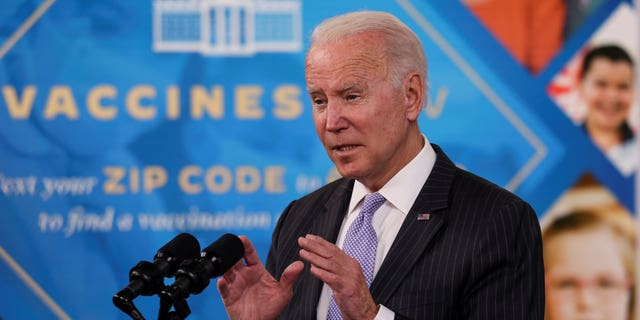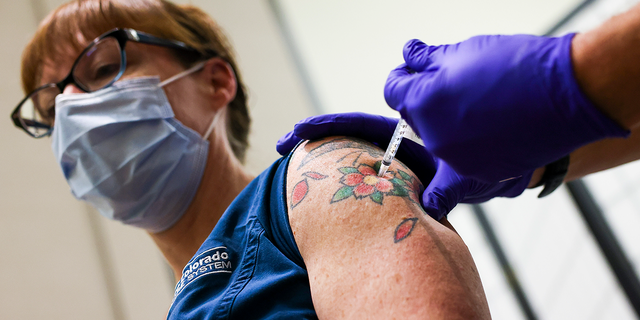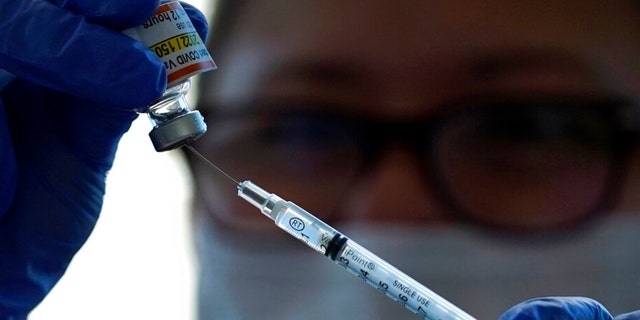NEWYou can now listen to Fox News articles!
With the Biden administration citing a “grave danger” to public health caused by unvaccinated Americans, the Supreme Court will hold a fast-tracked, high-stakes public session Friday to decide whether the U.S. government can begin enforcing sweeping COVID-19 vaccine requirements affecting nearly 100 million workers.
The justices will hear separate oral arguments over federal vaccine and testing rules for larger businesses and vaccine mandates for health care workers at facilities receiving Medicaid and Medicare funding. Enforcement of the policies – announced in November – has been put on holding pending resolution in the high court. Written rulings could come within a matter of days.

President Biden delivers remarks on the authorization of the coronavirus vaccine for kids ages 5 to 11, during a speech in the Eisenhower Executive Office Building’s South Court Auditorium at the White House in Washington, Nov. 3, 2021.
(REUTERS/Evelyn Hockstein/File Photo)
It comes amid a recent surge in reported COVID-19 cases, which health officials say is caused in part by the emerging omicron variant.
The oral arguments will stream live on FoxNews.com, beginning Friday at 10 a.m. ET.
SUPREME COURT JUSTICES ALL VACCINATED WITH COVID-19 BOOSTER SHOTS
Several Republican-led states, business coalitions, religious groups and other opponents have challenged the Biden orders – known as “emergency temporary standards” – as a federal “power grab” that intrudes on their autonomy. They say such sweeping rules cannot be imposed absent specific congressional action.
But the administration and its supporters say the pandemic has created an ongoing nationwide crisis that has killed more than 800,000 Americans, and that federal agencies have the power to impose rules protecting the health and safety of all workers.
“The justices put these cases on their calendar for a special argument. They’ve given every indication that they intend to decide the cases expeditiously. And of course, they’re deciding it against the backdrop of a health situation that seems to change by the hour,” said Thomas Dupree, a former Justice Department attorney and a constitutional law expert. “There’s no question that the Supreme Court is going to engage the fundamental questions of constitutional law and federal law that are at the heart of this case, concerning how broad the executive branch’s authority is to order vaccine mandates and to direct employers, federal employees, and private citizens to take certain steps in response to the pandemic.”

COVID vaccine distribution in Colorado
The issue represents not only the current administration’s evolving response to the pandemic but also could serve as a legal template to the regulatory limits of the governments across a range of future disputes over executive authority. In a larger sense, what powers do federal – and state – governments have in a national emergency?
A federal appeals court last month had ruled the federal government could enforce its “shot-or-test” rules for business with 100 or more employees, requiring them to be fully vaccinated, get tested weekly and wear masks at all times. That could affect 84 million American workers, and had been scheduled to go into effect this week.
Missouri is among the states challenging the federal rules that would be enforced by the Occupational Safety and Health Administration (OSHA). Officials there call it an issue of personal choice and individual liberty and say such mandates could lead to closed businesses and worker shortages.
“The federal government is supposed to be one of limited powers. And forcing the vaccine on tens of millions of Americans isn’t one of them,” Eric Schmitt, the state’s GOP attorney general, told Fox News. “OSHA is in charge of making sure forklifts beep when they back up, not forcing these kinds of vaccinations.”
BIAS BY OMISSION: 10 MAJOR CONTROVERSIES THE MEDIA AVOIDED COVERING OR DOWNPLAYED IN 2021
Other federal courts have blocked a separate mandate in 24 states. It requires a broad range of health care workers at facilities that participate in the Medicare and Medicaid programs to be fully vaccinated against COVID-19 unless they are eligible for a medical or religious exemption.
That policy would affect an estimated 17 million workers, and was also set to fully go into effect this week.
The Justice Department in its brief with the high court said most such workers have voluntarily been vaccinated, but that the policy needed to apply to all those working in about 76,000 health care facilities, as well as home care providers.
“That requirement will save hundreds or even thousands of lives each month,” said the administration, urging the high court “to allow the [Health and Human Services] Secretary’s urgently needed health and safety measure to take effect before the winter spike in COVID-19 cases worsens further.”

Lurie Children’s Hospital registered nurse Carolyn Ruyle prepares a dose of a Pfizer COVID-19 vaccine Friday, Nov. 5, 2021, in Chicago.
(AP Photo/Nam Y. Huh)
The White House in a statement said, “We are confident in the legal authority for both policies and DOJ will vigorously defend both at the Supreme Court.”
The two cases went quickly to the Supreme Court on the limited question of temporary enforcement, which the justices typically would have decided without a full briefing or oral argument. But in an unusual move, the justices scheduled a special sitting in its courtroom, and gave the competing parties little more than two weeks to prepare their public presentations.
But how the justices decide these “gateway” issues on granting emergency injunctive relief could be affected by how they view the merits of the larger legal and political issues at stake, given the urgent health crisis the administration cites in trying to impose these mandates.
Separate appeals over state vaccine and testing mandates have been allowed to be implemented, at least temporarily, after the Supreme Court gave the legal greenlight to rules in New York, New Mexico and Maine.
Supporters of such localized authority cite the Supreme Court’s 1903 ruling in Jacobson v. Massachusetts, upholding that state’s police power to enforce compulsory vaccination laws, in the name of broader public safety. Anti-vaccination advocates in Maine had challenged that high court precedent in seeking to block current COVID rules there.
The limits of federal authority, including the ongoing 2020 presidential “national emergency declaration” imposed by President Trump and extended by Biden, and the separate HHS “public health emergency” – both prompted by the pandemic – will now be tested at the Supreme Court.
As the high court noted more than a century ago, “an emergency may not call into life a power which has never lived,” but such “an emergency may afford a reason for the exertion of a living power already enjoyed.”
CLICK HERE TO GET THE FOX NEWS APP
The federal mandate cases for larger businesses are: National Federation of Independent Business v. Department of Labor, OSHA (21a244); and Ohio v. Department of Labor, OSHA (21a247).
The federal mandate cases for health care workers are: Biden v. Missouri (21a240); and Becerra v. Louisiana (21a241).